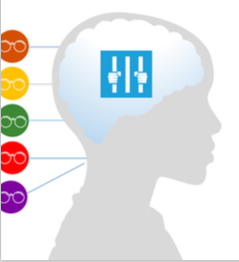How can people keep thinking something when evidence around them is screaming a different reality? How can we make sure that thinking blocks don’t happen to us?
It’s more common that we would like to believe. We may want to be independent thinkers, but we end up following the crowd, arriving at conclusions that are neither rational nor useful. That’s the way our brain works. We make a lot of assumptions, and some of these are necessary for our survival. But how do we know which assumptions are useful and which ones are blocking us? What if the way we habitually think created a wall, hiding all sorts of possibilities and opportunities?
Every day in the world we see examples of people clinging to a view of the world in spite of the evidence and failing to reconsider their beliefs. What about the time and energy that gets swallowed every day in useless meetings, or on a grander scale, the failure of repeated austerity policies in Europe?
The danger of inaccurate assumptions
For businesses and organizations, a structural inability to interpret reality is a deadly disease. We create our own paradigms and we get stuck inside them. Moving beyond that paradigm to innovation requires determination and dedication. It takes practice and skill. It requires moving beyond something that feels comfortable and familiar to something that might feel a little dangerous, but that’s another assumption.
A major stumbling block to growth for organizations lies in what we have come to call the ‘cognitive constraints’. In other words, there are mental models, or, more simply, limiting beliefs that prevent us from seeing solutions.
We need some of our assumptions, but we also need to distinguish the ones that are holding us back. Assumptions are, like any other mental construction, the result of external factors, like the environment, education, experiences, values, etc. and internal factors, like the chemistry and physics of our mind. The difference between an assumption and a statement of reality is only the realm of validity, and that can often depend on cultural circumstances. For example, what do people think about guns or healthcare in the US, Canada, and Europe?
A narrative on thinking for complex times
We must never be slaves to our assumptions. They must be challenged so we can find ways ahead. We’ve produced an entire narrative to chart a journey through various mental models, from the financial crisis and Wall Street, and towards the innovative possibilities of a new economy, based on a new economics. We believe our greatest challenge in our efforts towards prosperity is our ability to think things through. Complexity and interconnection increasingly define the life of organizations. This calls for a much better ability to think in a systemic way. We can learn to think better. There are methods and there are tools, not just so we can survive, but so we can continuously break through to greater and sustainable realities. Anyone in a leadership position needs to learn this.
The Human Constraint
We asked ourselves how we could share our broad experience in reexamining assumptions and creating breakthrough and innovation with organizations. We decided on a narrative, where people can read a story, understand its implications for their own circumstances, and access a method and tools to stretch their own thinking and challenge their mental models. The result is a business novel+website called ‘The Human Constraint’. Each chapter has a link so readers can access further insights and thinking process tools to improve their own thinking in a systemic way. We hope it will be of assistance to many. Our future depends on our collective ability to think thinks through.
Sign up to our blog here and shift your thinking towards broader, systemic possibilities for yourself and your organization. Intelligent Management provides education and training on systemic management, W. Edwards Deming’s management philosophy and the Theory of Constraints (Decalogue methodology) in North America and Europe.
About the Author
Angela Montgomery Ph.D. is Partner and Co-founder of Intelligent Management and author of the business novel+ website The Human Constraint , so far purchased in 21 countries around the globe. This downloadable novel uses narrative to look at how the Deming approach and the Theory of Constraints can create the organization of the future, based on collaboration, network and social innovation. She is co-author with Dr. Domenico Lepore, founder, and Dr. Giovanni Siepe of ‘Quality, Involvement, Flow: The Systemic Organization’ from CRC Press, New York.






Leave a Reply